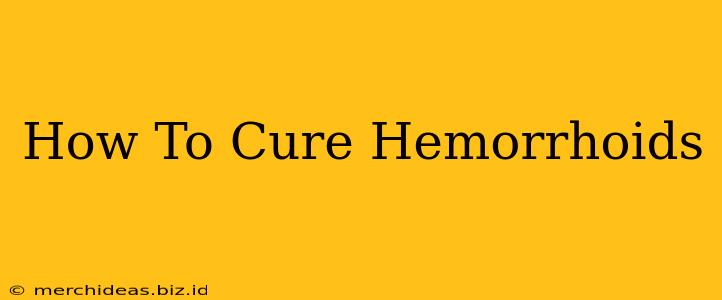Hemorrhoids, also known as piles, are swollen veins in the anus and rectum that can cause pain, itching, and bleeding. While not always curable in the sense of permanently eliminating the veins, many effective treatments can significantly alleviate symptoms and prevent recurrence. This comprehensive guide explores various methods to manage and cure hemorrhoids, from home remedies to medical interventions. Remember to consult your doctor for a proper diagnosis and personalized treatment plan.
Understanding Hemorrhoids: Types and Causes
Before diving into treatments, it's crucial to understand the different types of hemorrhoids and their underlying causes. Hemorrhoids are categorized as either internal (inside the rectum) or external (under the skin around the anus).
- Internal Hemorrhoids: These often don't cause pain unless they become thrombosed (a blood clot forms inside). Symptoms may include painless bleeding during bowel movements and mucus discharge.
- External Hemorrhoids: These can be quite painful, especially when a blood clot forms (thrombosed hemorrhoids). Symptoms include intense pain, swelling, and itching.
Several factors can contribute to the development of hemorrhoids, including:
- Straining during bowel movements: Chronic constipation is a major culprit.
- Pregnancy: The increased pressure on the pelvic veins during pregnancy can lead to hemorrhoids.
- Prolonged sitting or standing: Reduced blood flow can contribute to vein swelling.
- Obesity: Excess weight puts extra pressure on the veins in the rectum.
- Chronic diarrhea: Frequent bowel movements can irritate the rectal area.
- Low-fiber diet: A diet lacking in fiber can lead to constipation.
- Family history: A genetic predisposition can increase your risk.
Home Remedies for Hemorrhoid Relief
Many home remedies can provide relief from hemorrhoid symptoms, often offering a non-invasive first line of defense. However, these are usually best for mild cases.
1. High-Fiber Diet: The Foundation of Prevention
A high-fiber diet is crucial for both preventing and treating hemorrhoids. Fiber adds bulk to your stool, making bowel movements easier and reducing straining. Increase your intake of fruits, vegetables, and whole grains.
2. Hydration is Key
Drinking plenty of water helps soften stools, preventing constipation and reducing strain. Aim for at least eight glasses of water per day.
3. Sitz Baths: Soaking for Relief
Soaking in a warm sitz bath (a shallow bath that fills only your hips and buttocks) for 10-15 minutes several times a day can help reduce pain and inflammation. Add Epsom salts for extra soothing effects.
4. Over-the-Counter Treatments
Several over-the-counter creams, ointments, and suppositories are available to relieve hemorrhoid symptoms. These often contain ingredients like hydrocortisone (for inflammation) and lidocaine (for pain). Always follow the instructions on the packaging.
Medical Treatments for Hemorrhoids
If home remedies fail to provide sufficient relief, or if you have severe symptoms, your doctor may recommend medical treatments.
1. Rubber Band Ligation
This procedure involves placing a small rubber band around the base of an internal hemorrhoid, cutting off its blood supply and causing it to shrink and fall off.
2. Sclerotherapy
This involves injecting a solution into the hemorrhoid to shrink it.
3. Hemorrhoidectomy
This is a surgical procedure to remove hemorrhoids. It's typically reserved for severe cases that haven't responded to other treatments.
4. Coagulation Techniques
These procedures use heat or infrared light to destroy hemorrhoidal tissue.
Preventing Hemorrhoid Recurrence
Preventing hemorrhoid recurrence is just as important as treating them. By adopting a healthy lifestyle, you can significantly reduce your risk.
- Maintain a high-fiber diet: This remains the cornerstone of prevention.
- Drink plenty of water: Keep your stools soft and easy to pass.
- Exercise regularly: This improves overall circulation and reduces constipation.
- Avoid prolonged sitting or standing: Get up and move around regularly.
- Maintain a healthy weight: Reduce pressure on the pelvic veins.
- Don't strain during bowel movements: Listen to your body and avoid pushing too hard.
When to See a Doctor
While many hemorrhoids resolve on their own or with home treatment, you should consult your doctor if:
- You have severe pain.
- You experience bright red bleeding with bowel movements.
- You notice significant swelling or a lump near your anus.
- Your symptoms persist despite home treatment.
- You suspect a serious underlying medical condition.
This guide provides information on how to cure hemorrhoids and should not be considered medical advice. Always consult your healthcare professional for a proper diagnosis and tailored treatment plan. Early intervention and a proactive approach to lifestyle changes can significantly improve your chances of managing and preventing this common condition.
